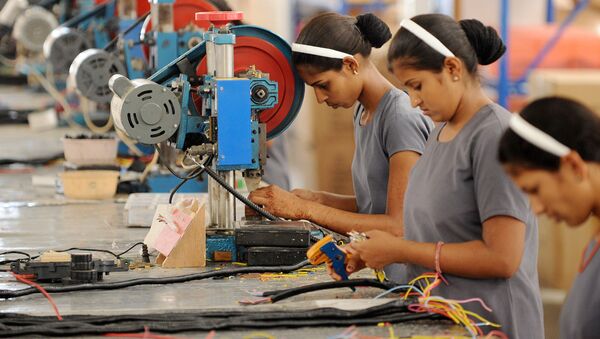While new automated technologies and improved workforce productivity certainly promises to lead to economic growth, it's a double-edged sword for Indian Prime Minister Narendra Modi. Here is the thing: Modi launched his ‘Make in India' campaign aimed at creating jobs for poor workers, but it's precisely the unskilled jobs they'd fill that are being completed by these hyper-efficient machines.
India is following the example of China, the world's fastest growing economy, in employing machines that blow away the capabilities of an average uneducated, low-skill worker.
"The need for unskilled labor is beginning to diminish," Akhilesh Tilotia, head of a thematic research group at Kotak Institutional Equities in Mumbai and a demographic impact author. "Whatever education we're putting in and whatever skill development we're potentially trying to put out — does it match where the industry will potentially be five to 10 years hence? That linkage is reasonably broken in India."
'#MakeInIndia lights India's path ahead as more & more global firms flock to #MakeInIndia' http://t.co/227cK0VBNp pic.twitter.com/diXgddgUtZ
— Make in India (@makeinindia) August 10, 2015
The city of Chennai, known as the "Detroit of India" for its developed automobile industry, is a place where automation will "likely compete with some low-skill tasks," says a special report from Standard Chartered.
At the Royal Enfield Motors Ltd factory outside of Chennai, four 2-meter (7-foot) robots from Swiss ABB Ltd. can perform the work of 15 laborers working across three shifts to detail and touch-up the paint jobs on the motorcycles of choice for celebrities like Brad Pitt and Billy Joel.
Robots — which won't strike, don't require breaks and, generally, don't make mistakes — would seem to be a good solution for hazardous jobs at Indian factories, where toxic fumes and the risk of repetitive motion injury can pose serious problems for workers.
"Turnover is very high, so you have a huge task training people, which incurs costs. That makes the payback for robots more favorable for a company," said Per Vegard Nerseth, head of business robotics at ABB.
Indian labor productivity ranks lowest among major developing economies, says a report by the Boston Consulting Group and the Confederation of Indian Industry. Brazilian workers, for example, are three times more productive than their Indian counterparts. Indian adults on average have no more than 4.4 years of formal education and are have low language skills, representing the worst figures among emerging Asian countries.
At the same time, India has the world's fastest growing working-age population, adding around a million per month, versus the million-or-so jobs created every year, says JustJobs Network report.
As for robots, despite a 23% rise in installations in 2013, India still trails behind China, the world's biggest robot market, which sold 56,000 robotic machines in 2014.
Madhur Jha, a London-based senior economist at Standard Chartered warns that India may lose out to Thailand, Indonesia and Malaysia, leaders among Asian countries in terms of robot density.
"Other countries are slightly more developed, have a stronger manufacturing base, and are moving toward automation more quickly to keep themselves competitive," said Jha.
"It'd be a lie to say that robots won't steal jobs," said Sonali Kulkarni, who heads the India unit of Fanuc Corp., one of the world's biggest robot makers. "They will, but not the jobs that people should be aspiring to. People are capable of really a lot more than mindlessly loading or unloading from a machine or welding."
"Time is not on India's side," said Thatman Shanmugaratnam, Singapore's finance minister and the International Monetary Fund's policy advisory committee chairman. "I give 10 years for labor-intensive manufacturing to survive in its present form before machines take over."


